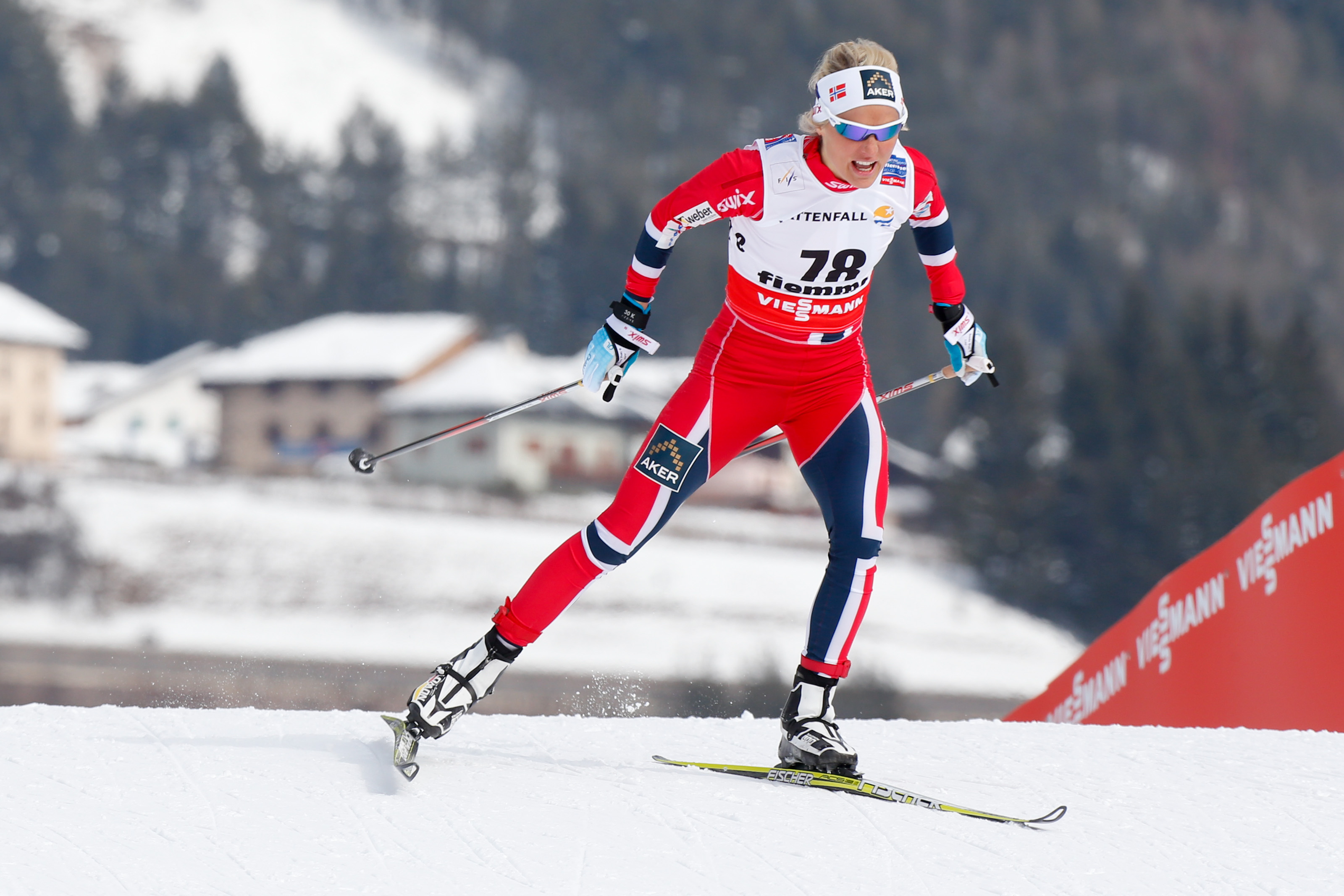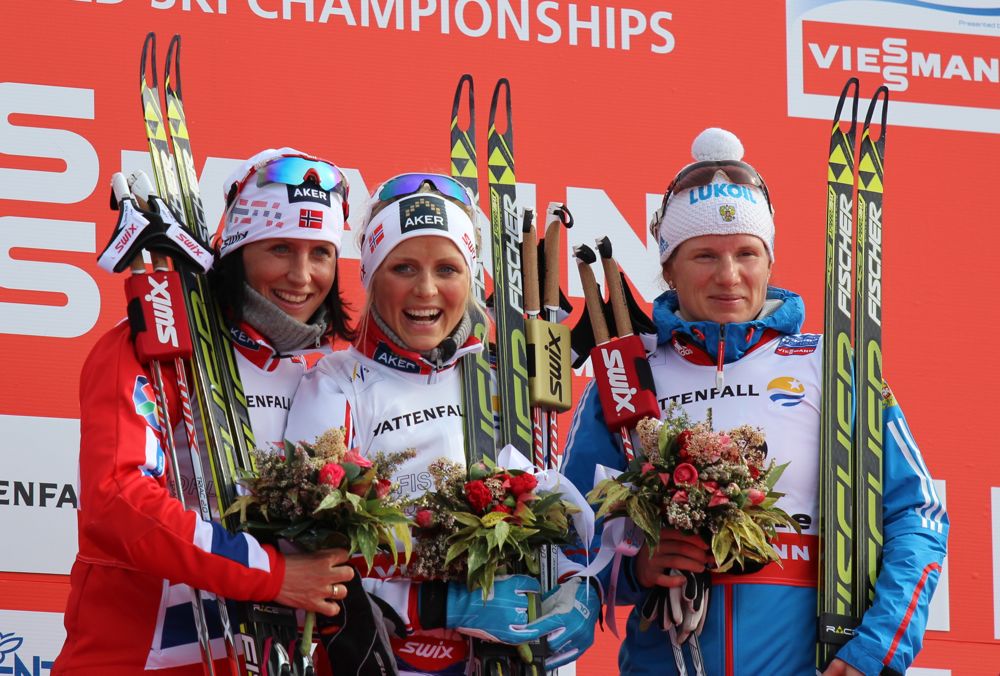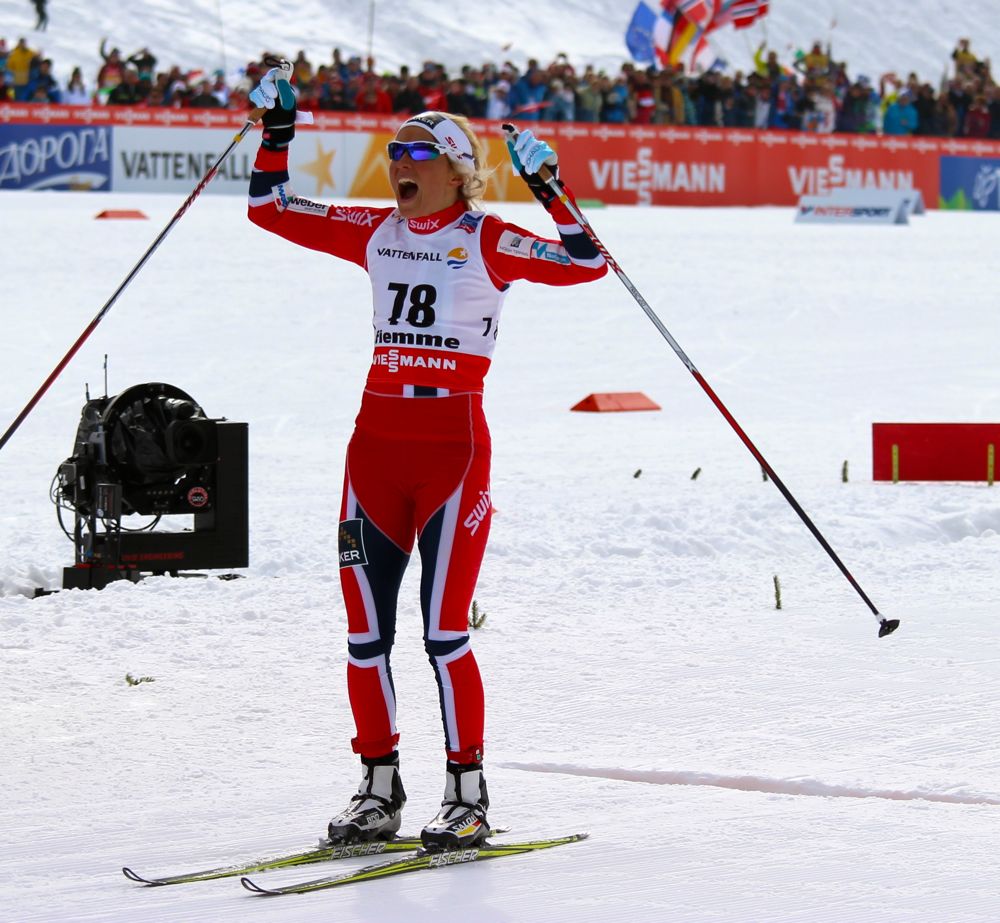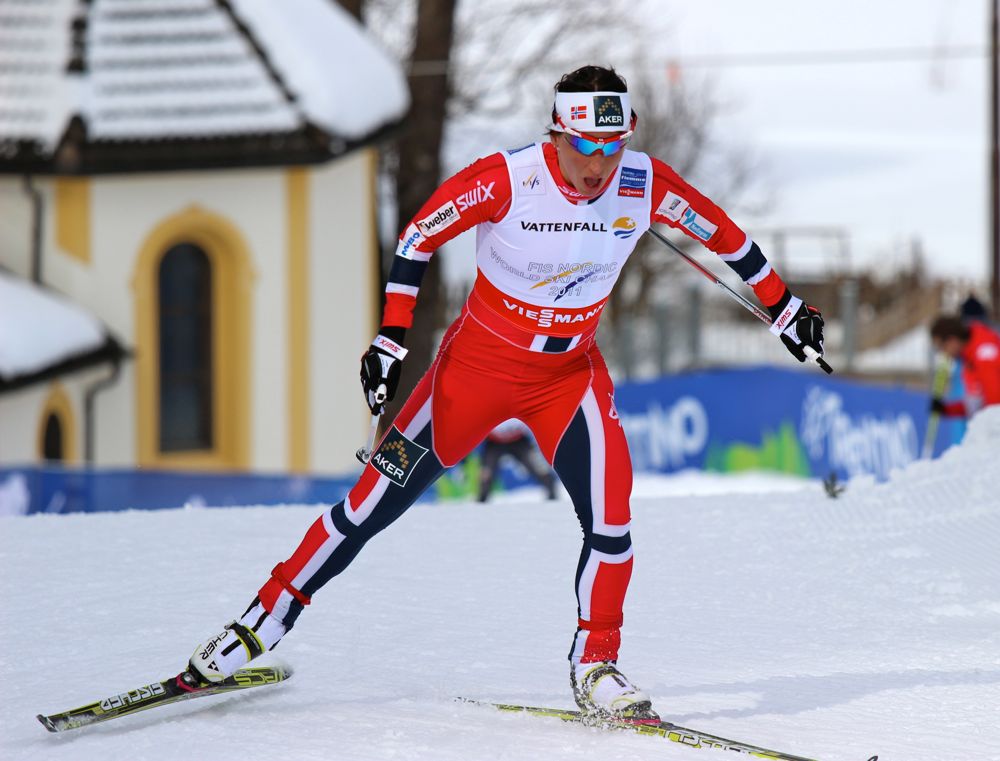
FasterSkier’s coverage of the 2013 FIS Nordic World Ski Championships in Val di Fiemme, Italy, is brought to you by the generous support of Fischer Sports.
VAL DI FIEMME, Italy – Two years ago in Oslo, Norway, Therese Johaug proved that her teammate, three-time Olympic medalist Marit Bjørgen is not untouchable – at least not in a 30-kilometer freestyle mass start.
The second-most-famous female currently on the Norwegian national team, Johaug beat Bjørgen by nearly 45 seconds in the 2011 event for her first individual World Championships title. Fast-forward to Tuesday, the 24-year-old Johaug was really looking to make something happen in the much-shorter 10 k freestyle individual start at the 2013 Nordic World Ski Championships in Val di Fiemme.
A whole different ball game, she thought, yet she still held out hope.
“I have a goal and I have a dream before this World Championships in Val di Fiemme to take the gold medal,” Johaug said at a post-race press conference. “I never thought I could do it in this distance.”
Before the start of the 1 ½-week championships, with four individual events per gender, Johaug figured her best chance was in the 15 k skiathlon. When that didn’t happen last Saturday, Johaug celebrated her silver-medal finish and Bjørgen’s gold, and refocused for Tuesday.
“When I wake up this morning … I had a good feeling inside,” Johaug said. “I was really focused that if I could do my best today, I could stand at the top of the podium.”

The last of 78 starters, Johaug had the advantage before setting out on the two-lap time trial. Bjørgen started 5 minutes ahead of her, and while Johaug couldn’t physically see her, she knew where she stood throughout thanks to several Norwegian coaches and staff scattered around the course.
Bjørgen was getting similar information about other top athletes, like German biathlete Miriam Gössner, who ventured to Italy for the individual race and Thursday’s relay, American Liz Stephen and Swedish Olympic champ Charlotte Kalla. The splits were almost constant, Bjørgen said, at least every kilometer, but she could only guess how hard Johaug was pushing behind her.
So she tried to go just as hard.
“I knew that today Therese was going to be my hardest competitor,” Bjørgen said at the press conference, a day after Polish rival Justyna Kowalczyk announced she wouldn’t race the 10 k to rest up for Saturday’s 30 k classic. That didn’t really affect Bjørgen; she knew exactly how much of a threat Johaug was.
“We were fighting all the way today, but in the end of the race, Therese was stronger than me,” Bjørgen said.
Up on Bjørgen by 4.5 seconds with about three kilometers left at the course’s high point, Johaug continued to pick up the pace on the long descent and last few climbs. As she entered the stadium before the finish, she heard that she was nine seconds ahead of Bjørgen as the current leader.

“I knew that if I push myself to the end of the race, I could do it,” Johaug said.
On the loudspeaker, she heard commentator Kjell-Erik Kristiansen proclaim she was the world champion; the time difference so great, it was certain. That’s when she knew. Johaug pushed through the line and collapsed at the finish, kicking her legs excitedly in the air.
“It was so big for me,” Johaug said. “Marit has been the queen of this distance before and she’s the queen of cross-country skiing, so for me it’s really good to beat her today.”
Bjørgen said finishing 10.2 seconds off Johaug’s winning time of 25:23.4 was a tribute to Johaug and a hard-fought silver for herself.
“I knew that she wanted the gold medal and we are best friends,” the 32-year-old said. “Pushing each other in training, I knew how strong Therese could be, and today I’m very happy for her.”
The two live less than 100 meters away from each other in Oslo, according to Johaug. That’s the reason she thinks they’re both doing so well at this year’s World Championships. Bjørgen has two golds between the classic sprint and skiathlon, and now a silver, and Johaug’s two medals contribute to the Norwegian women’s grand total of seven so far. Comparatively, their men’s team has three medals (before Wednesday’s 15 k freestyle individual start).
“We are a really good team,” Johaug said. “We’re training a lot together.”
Their most decorated member with nine individual golds at World Championships, Bjørgen credits teammates like Johaug for constantly raising the bar.

“I could see she really wants to be in the top level and it’s also motivated me,” Bjørgen said. “That’s one of the reasons I am in so high [a] level is because of Therese.”
Sharing the podium with the two Norwegians, Yulia Tchekaleva became the first Russian female to medal at World Championships since 2007. The 29-year-old started three minutes behind Bjørgen and ranked third through both the 1.8- and 6.8-k checkpoints on the course.
Tchekaleva threw herself across the line for what she thought could be silver, edging Gössner by half a second. The Russian’s time held strong for bronze, 32.7 seconds behind Johaug.
“I’m very happy … it’s very good for the Russian ladies,” Tchekaleva said through a translator. “I heard my coaches the whole way. I was skiing and they had information about who was first, who was behind me, and of course, the course is not easy.”
The 5 k loop featured at least six major climbs with average grades exceeding 9 percent. One of the best known hill climbers on the World Cup circuit, Stephen of the U.S. placed fifth, eight seconds behind Gössner.

“I woke up today thinking it was gonna be a good day and I’m glad it was,” said Stephen, who started 52nd and had the lead through 6.8 k until Bjørgen came through 20 seconds faster. It was her best finish at a World Championships and met her longstanding top-five goal.
“All week the plan’s been to kind of kick it up over the top of the hills and not blow up at the bottom,” Stephen said. “When I get tired, I lose a lot of time really quickly. Especially on these kind of climbs you gotta be able to glide and hang so the goal was to push over the top and just ski like I can ski.”
Gössner said she was left wanting a little more after missing the podium by 0.5 seconds and sitting in the leader’s chair for much of the race. Starting in 47th, she held off the likes of Stephen, Norway’s Heidi Weng (who was ultimately sixth), and Kalla (who ended up seventh) before Tchekaleva edged her at the finish.
“I’m a little bit sad,” Gössner told reporters. “It’s just half a second, but I guess the Russian girl is really happy now so it’s good for her and I just congratulate her. I will try to beat the others the next time. I will come back.”
Earlier this month, Gössner – a gold medalist in the 2011 and 2012 women’s relays at Biathlon World Championships – asked the German cross-country team if she could join them in Val di Fiemme. She had helped them win silver in the cross-country relay at the 2010 Olympics and was also on its second-place 2009 World Championships relay, so head coach Frank Ullrich didn’t see why not. The German men’s biathlon coach from 1998 to 2010, he knew exactly how fast biathletes could be in a straight cross-country race.
“She is physically strong and mentally strong,” Ullrich said. “She is very, very strong in biathlon with the rifle on her back and now the rifle not here, she’s better and better. It’s perfect, for the future for this team, for the relay. And we hope for a medal in relay. This helps Germany.”

In an interview with Biathlon News in early February, Gössner said it would be “a dream come true” to race at World Championships in the 10 k and 4 x 5 k relay.
“Before the race I didn’t know where I was standing so I tried to do my best and I had no expectations about medals or anything,” she said. “I just tried to make a good race and it was a fast race so I think it was OK.”
Bjørgen, for one, was glad to hold her off.
“She nearly won, [half a] second from the bronze, so it’s a good race for her,” she said. “We was better, the cross-countriers, so I’m happy for that.”
“We know that she’s a good athlete and she’s [doing] really good in the biathlon, so I knew before this race she would be a little bit of an outsider to come out and fight for the podium,” Johaug said.
At the Biathlon World Championships from Feb. 6-17 in Nove Mesto, Czech Republic, Gössner was fifth with the women’s relay (which Norway won) and sixth in the individual sprint.
“I think the gold medal is already gone to Norway, so we will fight for silver and bronze medal,” she said of Thursday’s cross-country 4 x 5 k. “I think we have a chance so we will try our best and do everything to reach the goal.”
Seventh on Tuesday, Kalla as the reigning Olympic 10 k freestyle champion left disappointed. It didn’t help that Sweden’s Crown Princess Victoria and Prince Daniel came to watch.
“It feels very empty right now,” Kalla told SVT, according to a translation.
An early leader with the fourth-fastest time through 1.8 k, she fell behind on the second lap.
“I had great coaching along the [way], but I do not know what … what I think,” Kalla said. “Was told that I fought for a medal, but it was pretty far away. I go too slowly.”
But as Crown Princess Victoria told Sportbladet: “Very strong effort. Unfortunately, it’s tough competition.”
Riita-Liisa Roponen of Finland was eighth, and Norway’s Kristin Størmer Steira, who started a minute in front of Johaug pushed her to the finish, crossing the line 1.6 seconds after, was ninth. Coraline Hugue of France placed 10th for her a career best at World Championships (she was 14th in the 30 k freestyle mass start in 2009).
— Audrey Mangan contributed reporting
Alex Kochon
Alex Kochon (alexkochon@gmail.com) is a former FasterSkier editor and roving reporter who never really lost touch with the nordic scene. A freelance writer, editor, and outdoor-loving mom of two, she lives in northeastern New York and enjoys adventuring in the Adirondacks. She shares her passion for sports and recreation as the co-founder of "Ride On! Mountain Bike Trail Guide" and a sales and content contributor at Curated.com. When she's not skiing or chasing her kids around, Alex assists authors as a production and marketing coordinator for iPub Global Connection.




2 comments
cuttsy
February 26, 2013 at 2:45 pm
Princess Estelle? Or Princess Victoria? Haha I’m sure Victoria translated the babble from baby Estelle…
Alex Matthews
February 26, 2013 at 3:46 pm
Good catch. Sorry about that. Something got lost in the translated version of that article. But, boy is that baby smart! We’ve made the correction.